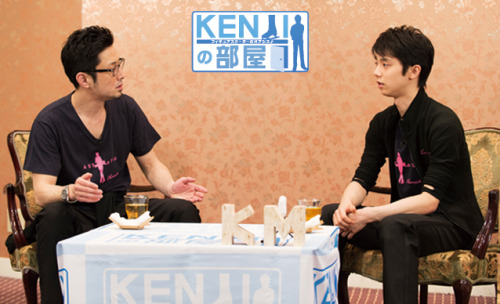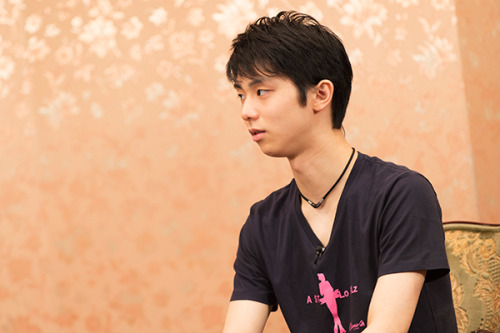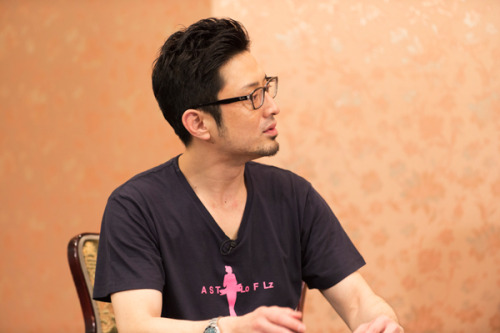Tradução feita por Yuzuland, obrigada pela ajuda aos fãs de Yuzuru que não falam japonês.
(15/09/15)
~Tohoku Earthquake~
K: Um…there was [Tohoku] earthquake, which was terrible… I don’t have the right to talk about it but it would be nice if we can talk about how that experience affected you, or your feelings and thoughts about it.
Y: Because of the earthquake…I don’t really want to use words that have positive connotation, like“opportunity”, [to describe the earthquake]. But if we ignore the positive or negative connotations, I will use the word “opportunity”; because of this earthquake, I felt more strongly about expressing my emotions*. On top of that, [it made me to consider] my feelings towards figure skating, the meaning of skating. And it is not only restricted to figure skating, but also my own identity as Yuzuru Hanyu. There were many identities to the name Yuzuru Hanyu: the usual Yuzuru Hanyu and the skater Yuzuru Hanyu, and there were many people who treated me as the symbol of the areas that were affected by the earthquake (Tohoku), so there is also Yuzuru Hanyu, who is the symbol of Tohoku. I struggled to decide the Yuzuru Hanyu that I should identify with. Although we were at a different perspective and situation, but Kenji, when you choreographed for me…you also experienced earthquake, and I think there are some feelings that are the same [for both of us]. [We share] the feeling of helplessness, inability of accomplishing anything on your own; this kind of sadness, pain, helplessness.
K: At that time, we did the programme “Hana Ni Nare”. Althought it was choreographed, but the singing, and the movement of the hands…were really good.
Y: That was probably the first time I skated to a Japanese song. It was also the first time Kenji choreographed for me. The reason why I keep skating to that programme is because I was saved by that song, even though it was made before the earthquake. When I was thinking about the meaning behind the lyrics, I thought I could relate my painful experience to it and express it [in the programme]. But i think by showing how I overcame this terrible experience, the audience can relate the lyrics to themselves, or to others. I still cherish and enjoy skating to this programme.
K: I am about to cry so let’s not talk about this anymore.
K: After [the earthquake], you have been performing very well. What did you feel when you participate competitions back then?
Y: At first, I didn’t want to [particpate]. I wasn’t exactly the representative of Tohoku, but Sendai also suffered from the damage brought by the tsunami and the nuclear power plant. So I was feeling like “I was merely skating because I enjoy it, why do I have to carry the burden [of representing the areas that were suffering because of the earthquake]. But meanwhile, I also felt that “I am the only one who can do this”. So at first, I said “I am not a representative of Tohoku, I will participate the competitions, as a Japanese skater, as Yuzuru Hanyu. But after several competitions, I received many letters and I realized that I want to perform better if someone can be happy when they see people like me, who’re from Tohoku, work hard. That’s what I felt when I was competing and I read the letters from people back in Tohoku and the entire nation. I was supported by all these encouragements.
It continued until Olympics; I was just doing what I love to do, trying to win and have better scores, but I could feel the enormous support from everyone. I think it is most important to accomplish something for someone else. For example, even if someone sends me a letter of encouragement, I am not getting better just because of the amount of letters I receive. Yet, I feel like everyone’s feeling is connected as one via myself. There are people who struggles because of the tsunami, the nuclear power plant, or cannot go back home because their houses were destroyed by the earthquake. These people and people from west Japan, Tohoku, east Japan can be connected through me. I am so happy about this then, and now and when I took the Olympics gold medal.
K: When you first came and skated in Kobe, everyone cried and thought it was great.
Y:I remember Kenji was having a really painful expression. I did “White Legend” and I still remember it clearly. That is my motivation to skate.
K: I think it was fantastic.
Y: I think I cannot skate like that anymore in my life. I could only express like that with my feelings back then. It was an expression of trying to fly away from darkness, that performance was special to me too. If I was not invited to Kobe, I must be still thinking “should I be skating” when I skate. I’m glad you invited me to Kobe, sincerely.
K: Thank you.
Y: Not at all, I should be saying that.
~ World Championship 2012~
K: Your first world championship, you placed third. How was it?
Y: To me, worlds is a very special place, it was the stage of my dream, where all the skaters who I admire since I was young competed at. And to be on the podium in that competition, it was almost like a dream come true. I remember being very happy.
K: So it was like “Kya—!!”
Y: It was “Kya—!!”. But the short programme was horrible. I was placed 7th after short and wasn’t in the final group. It became quad-double jump and the triple axel was not good and I popped the lutz. I thought “lutz again.” I am horrible at short.
K: Why is that? Are you nervous?
Y: I don’t know, I think it would be easier to skate short. I am bad at short.
K: It’s that, we talked about it before. You think too much.
Y: It is common for me to think too much. But, I think I have to maintain a nice balance between feeling, rhythm and theory in order to have a good performance. If the ratio is 1:1:1, it would be disastrous if the ratio becomes 1:2:0.5.
K: Okay. And you went to Canada then?
Y: I changed my training base to Canada after 3rd place in Worlds.
K: and receive training from Brian?
Y: Yes.
K: It is not related but Brian taught me how to jump Axel when I was in high school.
Y: Axel?
K: Maybe it wasn’t axel.
Y: You were a single skater.
K: Yes I was.
K: You went to Toronto, Cricket right?
Y: Yes, Cricket club.
K: The nacho from the place under Cricket club is very good, right?
Y: I haven’t tried it yet. Under [cricket club]?
K: I don’t know if it is still there. I think the building is still the same. There is a huge grass field right?
Y: Yes, a cricket playground.
K: Oh, a cricket ground…I always play Frisbee there.
Y: Frisbee?
K: Yeah, eating nachos and playing Frisbee. Of course I did practise too.
Y: [Cricket] is a really good training environment. In Canada, especially Cricket club, training clubs really base everything for the need of the skaters. It is exclusive to members, there are tennis courts, gym, pools, cricket ground. It’s a very sophisticated facility. My younger self wouldn’t even imagine myself training in such a nice environment. My home rink was closed once…no twice. Before I moved to Katsuyama, I was training in the rink in Izumi. You know Izumi, right? (K: Yes). That rink in Izumi closed because of financial problem. Then I moved to Katsuyama, but Arakawa reopened it after she earned gold medal in Torino. She asked for it in the press conference in Torino. With the help from the government, the rink was reopened. But after the earthquake, it was closed again. So I understand how precious it is to have a good training environment. So, an environment, like cricket, allows me to concentrate on my training, do my warm-up as the way I want, cool down and pretty much everything. Now I know how important training environment is.
K: So you don’t play Frisbee there?
Y: No I don’t play Frisbee.
K: But why did you choose Brian Orser to be your coach?
Y: Training environment was quite a big deciding factor. Instead of saying I chose Brian… I usually perform really well in practise, ice show or official practise. For example, I landed my first quad in a practise for an ice show. I land all my first quads in practise, not in supervision of Brian or any coach. Same for my triple axel, which I landed in the training camp. So I wanted to be in an environment where there are good rivals. So I decided that I want to train with Javier Fernandez, who really improved a lot that year and his jumps stabilized after he moved to Cricket, so I thought I will improve if I go there [and train along side with him].
K: ‘cause you hate to lose
Y: Yes, I hate to lose even in ice shows.
K: Yeah you hate to lose so much. Javier and Nam are practicing with you there. Do you have any funny story?
Y: Um…Javi and Nam sometimes do something and play around for a bit, and I just observe and continue on my training.We don’t compete against each other, well it may not be funny but, every time Javi skates a clean free programme in practise, I am not in my best condition, I will pop all my jumps in my free. It always happen, [it’s bad] to the extent that people will think whether I’m putting in any effort at all. In those times, Javi, instead of my coach, will come and cheer me up. It happens the other way too; if Javi is having a bad day and I have a good day, I or Nam will go and cheer him up, like “it will be fine”, “you were able to land that jump the other day”.
K: So it’s a friendly rivalry (Y: and friends) and you [improve as you challenge each other]. Do you have any other skaters you are particularly close to?
Y: Yes, I don’t think you will know them by names. (K: I think I will know) I don’t think you will. (K: Say it.) I don’t think you will know. (K: So you don’t want to say the name?) No, not that I don’t want to say the name. (K: Who? I have been to Cricket club) It’s a different generation. (K: Who?) Maybe I don’t have any skaters that I am close to. In Cricket, I am not the talkative and enthusiatic type. (K: you are when you are in Japan though) In Japan, I will be like that because I don’t train here.
K: Oh because you have to concentrate [in Cricket].
Y: Yeah. The difference between my personality when I’m serious on skating and when I’m not is very big.
K: Oh I understand. Sometimes, I would tell you to practise for a bit [while I choreograph] and when I want you to come back, it is hard to talk to you [because you are so focused.]
Y: Yeah because I was so focused. My mood when I am focused on skating and when I am joking around with friends or when I am having fun with Nobunari-kun is completely different.
K: In the bus, you and Nobu are always having fun.
Y: Mainly, it’s Nobu who is having fun (K: No that’s not true.) Recently, my tsukkomi skill is getting better. When Nobu is being silly (boke) or doing something that allows people to give him a comeback (tsukkomi) on. (K: so you just had to say it) Yes so I did. I can’t stop myself from saying those comeback comments (tsukkomi).
K: Really? Next time, invite me as well. (Y: I think you pretty much joined us already) I did?
Y: But sometimes you are like “I have had enough”
K: I never. But the bus rides are really fun. (Y: Yeah) Brian…Orser-san. I tend to just call him Brian. (Y: Brian is fine. That’s how I call him.) You changed your coach to Brian and after that you improved a lot. You won Japan Nationals for the first time. And then Grand Prix.
Y: That year (2013), after I changed my coach to Brian, in my first Grand Prix event, I marked the world record for short programme and that made me famous. (K: You were quite famous already.) That was a surprise to me too. The jumps were perfect but many other aspects of the programme were not. I got 95 with a performance that I was not satisfied with. I thought “95? Shouldn’t it be 85?”
*direct translation: The earthquake was an opportunity for me to broaden the upper limit and the lower limit of my feelings towards expressing my emotions.
**Tsukkomi and boke: the way many comedians in Japan say their jokes. Boke will do or say something silly and Tsukkomi will say a funny comment to makes fun of the boke
Source photos: yuzuland.tumblr
@violet_bird0214
@jsports_figure
Read more: JSPORT , JSPORT
Video of this talk can be viewed here.






0 comentários:
Postar um comentário